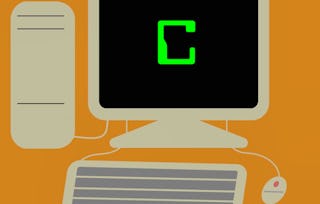Embark on your programming journey! This introductory course teaches you the fundamental principles of programming in C that are applicable to any language you might want to learn. Master a powerful seven-step problem-solving process for developing effective algorithms. Learn to read and understand code, transforming complex challenges into manageable solutions. No prior experience needed. Develop core skills for software development and enhance your career prospects in diverse fields. By the end of this course, you will be able to develop algorithms that are specific and correct.

Programming Fundamentals

Programming Fundamentals
This course is part of Introductory C Programming Specialization



Instructors: Andrew D. Hilton
233,123 already enrolled
Included with
6,990 reviews
What you'll learn
Apply the Seven Steps problem-solving process to develop effective algorithms.
Analyze code with functions, conditional statements, iteration, and other fundamental techniques.
Identify data types beyond integers and some important caveats for avoiding programming mistakes.
Skills you'll gain
Details to know

Add to your LinkedIn profile
19 assignments
See how employees at top companies are mastering in-demand skills

Build your subject-matter expertise
- Learn new concepts from industry experts
- Gain a foundational understanding of a subject or tool
- Develop job-relevant skills with hands-on projects
- Earn a shareable career certificate

There are 4 modules in this course
This module introduces a powerful process for solving any programming problem—the Seven Steps. You will learn how to approach a programming problem methodically, so you can formulate an algorithm that is specific and correct. You will work through examples with sequences of numbers and graphical patterns to develop the skill of algorithm development.
What's included
8 videos10 readings4 assignments
In this module, you will learn to read code—this means you will be able to execute a piece of code by hand, and clearly illustrate what each statement does and what the state of the program is. Understanding how to read code is the only way to be sure you can write correct code. By the end of this module, you will be able to read and understand code with functions, conditional statements, iteration, and other fundamental techniques.
What's included
12 videos17 readings8 assignments
Everything is a number to a computer, but types determine the size and interpretation of numbers. In this module you will learn about types beyond integers, both their conceptual representations, and their hardware representations in binary. You will learn basic data types, "non-number" types, and complex, custom types, as well as some important caveats, so you will avoid type-related programming mistakes.
What's included
8 videos18 readings6 assignments
You have learned a lot about designing algorithms and the programming concepts that will help you implement them. For this project, you will develop and test your own algorithm for sorting data. This module will reinforce the importance of being specific when you write an algorithm and provide an opportunity for you to do so yourself, for a very common computational task: sorting.
What's included
2 videos2 readings1 assignment
Earn a career certificate
Add this credential to your LinkedIn profile, resume, or CV. Share it on social media and in your performance review.
Instructors

Offered by
Explore more from Algorithms
 Status: Free Trial
Status: Free TrialUniversity of California, Santa Cruz
 Status: Preview
Status: PreviewSimplilearn
 Status: Preview
Status: PreviewUniversity of Toronto
Why people choose Coursera for their career

Felipe M.

Jennifer J.

Larry W.

Chaitanya A.
Learner reviews
- 5 stars
74.73%
- 4 stars
20.04%
- 3 stars
3.01%
- 2 stars
0.82%
- 1 star
1.37%
Showing 3 of 6990
Reviewed on May 6, 2020
Very in-depth and detailed explanation in introoductionto programming.If you are a beginner,I recommend you start with C.Some background is crucial or you will be confused in the later lectures.
Reviewed on Jan 27, 2021
It's a very good as a beginning with programing language. It helped me to think like a compiler and how it exactly works. I've finally understood the saying "Everything in computer works in logic".♥
Reviewed on Aug 13, 2020
The instruction provided in this course are very clear and anyone who can learn coding by this course. But the course has more readable content for you to take notes and reading it may take more time.

Open new doors with Coursera Plus
Unlimited access to 10,000+ world-class courses, hands-on projects, and job-ready certificate programs - all included in your subscription
Advance your career with an online degree
Earn a degree from world-class universities - 100% online
Join over 3,400 global companies that choose Coursera for Business
Upskill your employees to excel in the digital economy
Frequently asked questions
No. Completion of a Coursera course does not earn you academic credit from Duke; therefore, Duke is not able to provide you with a university transcript. However, your electronic Certificate will be added to your Accomplishments page - from there, you can print your Certificate or add it to your LinkedIn profile.
To access the course materials, assignments and to earn a Certificate, you will need to purchase the Certificate experience when you enroll in a course. You can try a Free Trial instead, or apply for Financial Aid. The course may offer 'Full Course, No Certificate' instead. This option lets you see all course materials, submit required assessments, and get a final grade. This also means that you will not be able to purchase a Certificate experience.
When you enroll in the course, you get access to all of the courses in the Specialization, and you earn a certificate when you complete the work. Your electronic Certificate will be added to your Accomplishments page - from there, you can print your Certificate or add it to your LinkedIn profile.
More questions
Financial aid available,


